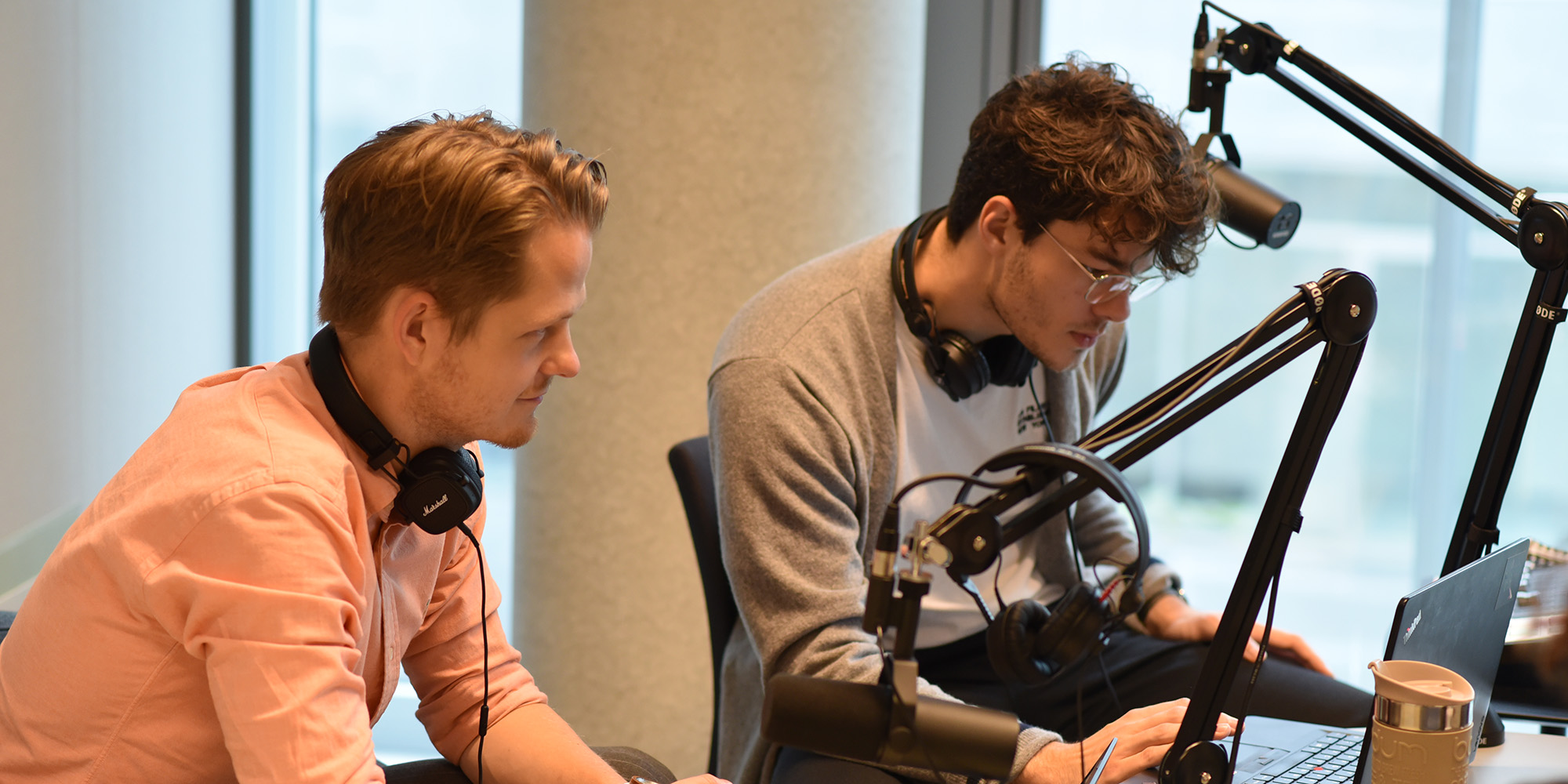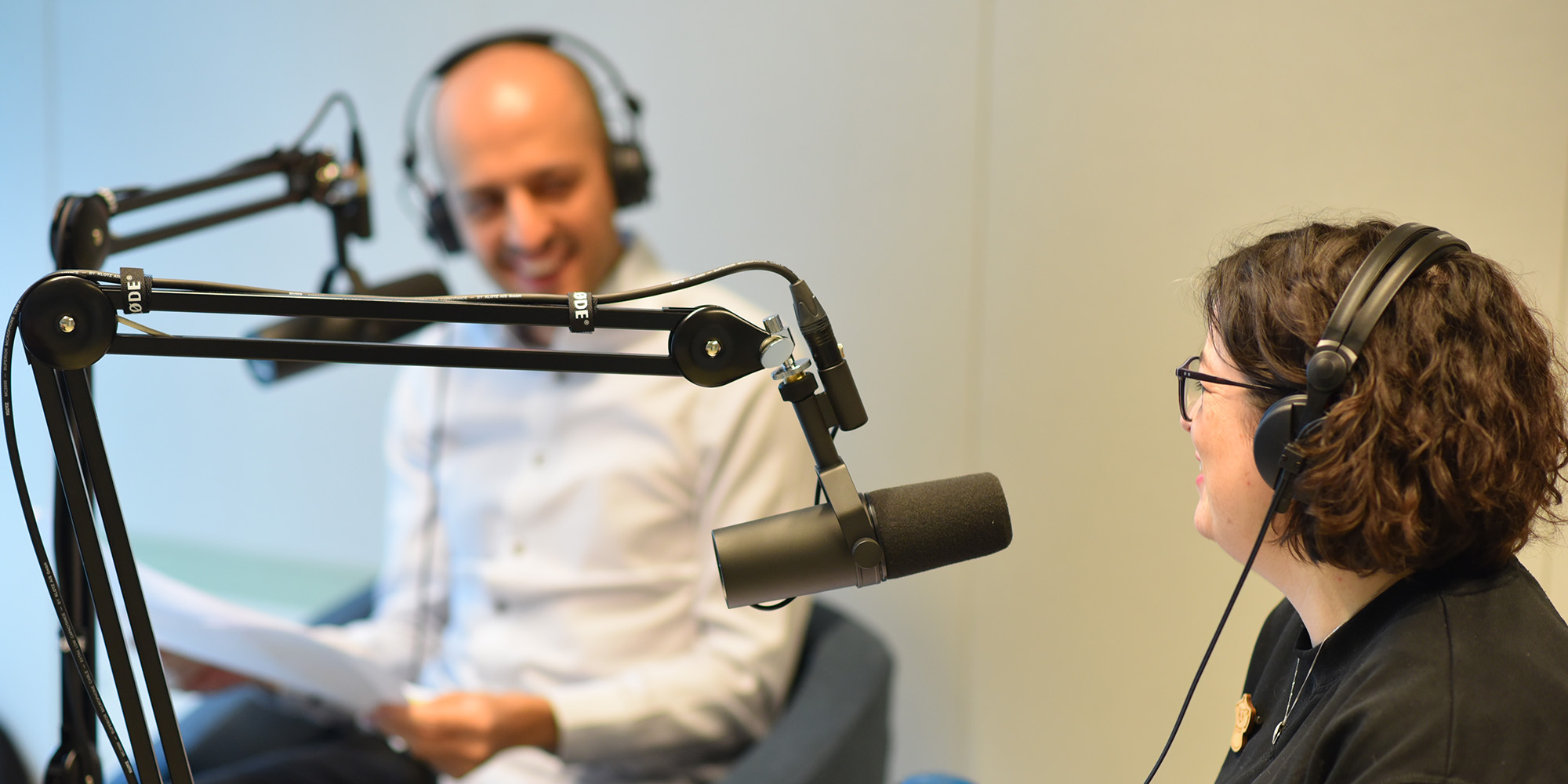Lectures by live radio: Pandemic paves the way for new teaching methods
The logistical challenges that come with the corona restrictions have spurred creativity among ITU’s teachers. This semester, half of the lectures in the course ‘Navigating Complexities’ have been transformed into a live radio show complete with news, discussions and music breaks. The radio format provides new opportunities to convey complex knowledge to the students, the teachers say.
Business IT DepartmentEducationstudent lifeBaki CakiciJessamy Perriam
Written 5 November, 2020 10:47 by Vibeke Arildsen
These are different times – also at the IT University of Copenhagen, where the current social distancing rules demand that part of the teaching must take place in the virtual arena.
When it became clear just a month before semester start that there was only auditorium space available for half of the planned lectures in the master's course 'Navigating Complexity', Baki Cakici and Jessamy Perriam, both lecturers in the Business IT Department, were catapulted into a ‘flurry of brainstorm’.
"In the spring, we had to adapt the syllabus very quickly to video-based teaching via Zoom, jumping week to week and trying to make it work. It was quite exhausting both for us and for the students, so we wanted to try something different this semester," says Jessamy Perriam.
Accessible communication of complex concepts
The two researchers had long been considering experimenting with the radio medium. But since ITU had just acquired new premises in DR Byen with a professional radio studio available, this semester presented an obvious opportunity to jump into it.
 Two Teaching Assistants help out during the show and serve as a link between lecturers and students.
Two Teaching Assistants help out during the show and serve as a link between lecturers and students.
‘Navcom Radio’ went on the air in late august, and now broadcasts every Wednesday from 10 to 12 to around 130 first-year students in the Digital Innovation & Management master’s programme. The radio show supplements a more traditional lecture on Mondays. At the core of the show is a discussion between two lecturers of two texts, which the students have been assigned to read and discuss beforehand.
What I like about the radio medium is that it provides an opportunity to explain rather high-level concepts in an accessible way.
Jessamy Perriam, lecturer, ITU
“What I like about the radio medium is that it provides an opportunity to explain rather high-level concepts in an accessible way. This is especially an advantage in our field, Science & Technology Studies, which on the one hand is very applicable to society, but also has a tendency to become a bit caught up in its own vocabulary,” says Jessamy Perriam.
Elements from the radio genre
In designing the show, Jessamy Perriam draws on her previous career as a radio journalist and producer, incorporating the elements of the radio genre. During the show, students have the opportunity to ask questions or share their comments via Zoom, music breaks ensure a good flow, and there are ‘news updates’ in the form of practical information for the students.
 ''Navcom Radio' goes live every Wednesday morning from at professional radio studio at ITU.
''Navcom Radio' goes live every Wednesday morning from at professional radio studio at ITU.
The students are encouraged to listen in live, although the recording is also available afterwards.
“We have chosen to broadcast live instead of recording a podcast in advance, because it gives a completely different level of interactivity and dynamic that the students have the opportunity to contribute to the conversation through the Zoom chat. The show feels like a collaboration between us teachers, the teaching assistants and the students,” says Baki Cakici.
The radio format has sparked discussions that would not normally take place during a lecture, says Jessamy Perriam.
"For instance, the students have brought up interesting questions about ‘The Social Dilemma’, a new documentary about social media, and we had the opportunity to discuss the issues raised by the documentary which relate to the course. That type of discussion would not arise during a normal lecture, where students expect the teacher to deliver a presentation of the theory with some slides. The radio show is more of a conversation about what things actually mean in practice,” she says.
Discussions as an exam rehearsal
As such, the radio show is a good preparation for the oral exam, where the students will discuss texts and relate them to their final project, says Baki Cakici.
In the beginning, the students were worried that they could not keep all these complex discussions in their heads, but I think we have now made it clear that not everything we discuss is something the students need to memorize. Instead, you can see the broadcasts as a kind of rehearsal for the type of discussion we will have during the oral exams.
Baki Cakici, lecturer, ITU
“The students hear the teachers discuss and connect the texts to other texts, or to broader societal or existential issues. In the beginning, the students were worried that they could not keep all these complex discussions in their heads, but I think we have now made it clear that not everything we discuss is something the students need to memorize. Instead, you can see the broadcasts as a kind of rehearsal for the type of discussion we will have during the oral exams,” he says.
The lecturers are working on further developing their radio concept and expect to use it in their teaching next semester, regardless of what the corona situation is at that time.
"For instance, we hope to invite researchers from all over the world onto the program, so that the students will not just hear us teachers discussing with each other, but also get input from some of those who have actually written the texts," says Jessamy Perriam.
Vibeke Arildsen, Press Officer, phone 2555 0447, email viar@itu.dk